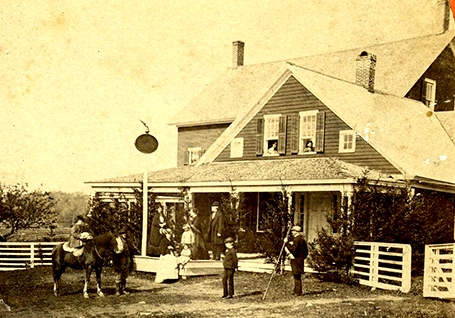Preserving the Bread Loaf Inn

MIDDLEBURY, Vt. – A two-year project to renovate and winterize the Bread Loaf Inn – the centerpiece of Middlebury’s Bread Loaf campus in Ripton, Vt. – will be completed in time for the 96th session of the Bread Loaf School of English in June 2015, according to the project’s planners.
The rambling, three-story, 60-plus-room structure, which started life as a simple farmhouse along the stagecoach road from Woodstock to Middlebury, is today a construction site teeming with carpenters and masons and mechanics. The lath-and-plaster walls have been stripped to the studs exposing hand-hewn beams that were cut nearly two centuries ago.
All new electrical, heating, plumbing, lighting, fire detection, and sprinkler systems are being installed. When the project is completed next spring, the Inn will be fully functional 12 months of the year. It will have an elevator, new furniture, all-new wall and floor coverings, and be ADA-compliant.
“The building has been well maintained over the years,” said Middlebury’s project manager Tom McGinn, “and when this project is finished, the Inn will still retain most of its historic character. The work we are doing ensures that the Inn will be structurally sound and winterized for many generations to come.”
The first phase of the project began in 2013 when the building was lifted into the air. A new foundation (with marble veneer) and concrete basement were poured to replace the former dirt-floor crawl space. The new basement will house food and general storage, the heating plant, and other utilities.
| Click on photo to view slide show |
| [view:embed_content==488128] |
Originally a four- or five-room farmhouse, the building was never intended to bear the weight of the School of English, the Writers’ Conference, or any of the other events at the Bread Loaf campus. That’s why the renovation project is also an engineering marvel: an all-new steel substructure of concealed I-beams and columns has been installed to support the load of the floors above.
The second phase, going on now, will leave no space untouched. In addition to all the new systems, the kitchen is being expanded and redesigned, a new interior staircase is being constructed, and all of the old plaster has been removed and will be replaced with drywall and fresh paint. The building is being fully insulated to withstand the harsh Vermont winters; new emergency exits and fire escapes will be installed; and a new roof now caps the historic structure.
The original window sashes and panes on the south side of the Inn facing the road are being restored. They will be reinstalled along with nearly invisible double-pane storm windows in order to keep the antique window glass and still gain the thermal efficiency of modern windows.
Joseph Battell, the Middlebury businessman and early environmentalist, bought the original farmhouse in 1866 – the first of many parcels of land he acquired in the Green Mountains. By the time he died in 1915 it was said that when Battell “stood upon the horseblock in front of his original purchase, everything in sight belonged to him.” He owned an estimated 31,000 acres of land – all of which he bequeathed to Middlebury College, of which he was a member of the Class of 1860.
George K. Anderson, who wrote the book “Bread Loaf School of English: The First Fifty Years” (Middlebury College Press, 1969), said Battell developed “the little farmhouse…into an extensive summer inn, approximating the typical late-19th century spa.” Over time, Battell “added two large wings and a long rear ell to his farmhouse, and finally a third story.”
On a brisk November morning more than a century later, Middlebury’s architect, general contractor, and project manager are meeting in a third-story bedroom to examine the renovations that have transpired over the past few days. The architect is concerned about how the drywall in this section of the Inn was installed, which causes the general contractor to summon the subcontractor who performed the work.
Ten minutes later it is decided that some of the drywall will have to be removed, recut, and reinstalled – a clear indicator of the scrutiny that is going into every inch of the $9.1 million renovation project of the Bread Loaf Inn.
— Written by Robert Keren; photo credits Special Collections, Robert Keren, and Casey Kelbaugh

